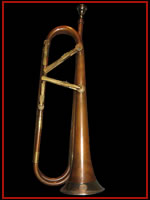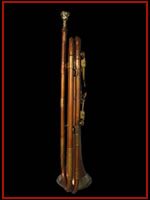The Limits Of The Research
With this kind of research, there is an inherent limitation that must first be understood. My discoveries are, however generic, still highly specific to me, and the particular instrument I have used.
Whilst many of the ideas concerning how to play the keyed trumpet will apply to any instrument, by any maker, I cannot guarantee that observations of physical characteristics that I have made, will apply to all keyed trumpets. As with all instruments, some are more successful than others, be they more precisely made, mechanically more proficient or in the case of historical reproductions, more accurately copied.
When the opportunity to examine and play other keyed trumpets is available to me, I shall have more of an awareness of how my discoveries relate to the instrument in a wider sense. In addition, I will be more sensitised toward the instrument, an idea supported by Peter Giopulos’ article; Play as Transformation: A Potter’s World.
In this article, Giopulos explores ideas such as 'play' and the development of a relationship between, in this case, a potter and the pots he creates. Discussing sensitisation, Giopulos writes; 'The quality of the experience has meaning for the particular potter and the observer, and a sensitised observer takes an enriched horizon to the next potter's world.'
As a performance based researcher, I am in the position to be both 'Potter' and 'Observer', gaining experience enriched by my discoveries whilst playing, in addition to those after reflection on my recordings.
Sensitisation has for me, been a process of becoming aware, through the development of my relationship to the instrument (although not always consciously) of the trumpet's needs and the way it reacts when played.
Giopulos writes of the process, that 'the movement requires action and reaction to do something.' in terms of my study, as the relationship between myself and the trumpet develops I become more sensitised towards the instrument and the process itself. The idea of 'to and fro' motion acting on the developing relationship, highlights that this development is not linear or in constant forward motion. Negative factors such as misunderstood information or 'dead-end' discoveries whilst delaying the final conclusions of the research cannot fail to enrich it.
Perhaps there can be considered a divide between progress and learning. Progress suffers set backs caused by poor choices resulting in wasted information. Learning however, which develops continuously alongside progress, considers all the information, useful or wasted, and develops new, informed conclusions as a result.





Time and opportunity have also provided significant limits to my research. I cannot claim to have spent time studying and practising the keyed trumpet every day. Indeed, entire weeks often go by without my playing the instrument. Yet learning in this way has inherent advantages. Time away from the instrument allows for reflection and analysis, and new avenues of interest are often discovered when I allow myself to think around the direct focus of the study.
One particular limit that has been successfully overcome concerned air leaking from the instrument. The leather pads covering the holes had become too dry to maintain a proper seal. If the instrument leaks air, all tonal precision is lost and the instrument becomes almost impossible to play with any accuracy. This problem was dealt with at first by putting water on the pads to improve the seal. However the pads, which on my instrument are now some fifteen years old, eventually needed water after almost every phrase.
Naturally this was unacceptable for performance and so I have taken to using rubber bands to hold down the keys when they are not open. Although rubber bands do nothing for the aesthetic quality of the instrument, they do increase its effectiveness.
Unsurprisingly, I have not found any documented evidence of improving the air seal of the holes, least of all with rubber bands. However, there is no reason to suppose that a regularly played and well maintained instrument would suffer in the same way as I have discovered and renewing the leather pads frequently would further reduce this problem. Another short term solution would be to carry a spray bottle filled with water, which could be used to moisten the pads more efficiently.
Finally, for the purpose of this research it must be realised that whilst my observations are true to my own instrument, they are in no way generically definitive.